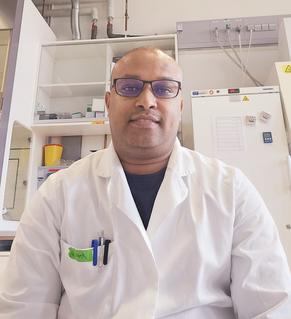Strengthening Ethiopia's vaccine development with new technologies
Arbovirus infections such as dengue fever can lead to serious illness and death. The Bio and Emerging Technology Institute (BETin) in Ethiopia is focusing on the development and diagnosis of vaccines against arbovirus infections with the help of new technologies and international cooperation. Dr Amare Aregay, a virologist and immunologist based in Germany, supported the institute in this endeavour.
Profile
- Name:
Dr Amare Aregay
- Professional background:
Virologist and immunologist
- Place of assignment:
Bio and Emerging Technology Institute in Ethiopia (BETin)
- Duration of assignment:
3,5 weeks

There are still no approved vaccines against many arbovirus infections such as the Zika virus, even though climate change is contributing to the spread of these infections. Arboviruses are mostly transmitted by mosquitoes and are prevalent in regions such as Oromia and Somali in eastern Ethiopia, where more than 50 million people live. BETin is one of the largest research-based government institutes in Ethiopia and has already developed a poultry cholera vaccine. However, the institute faces challenges in keeping up with the latest technology needed to identify and characterise arboviral infections.
Amare grew up in Ethiopia, studied in the Netherlands, earned his doctorate in Germany, and works as a postdoctoral researcher at the Research Centre for Emerging Infections and Zoonosis (RIZ), which is part of the University of Veterinary Medicine Hannover Foundation. His focus is on zoonoses – pathogens that can infect both humans and animals. His goal as a diaspora expert was to strengthen BETin's vaccine development capabilities so that they can better identify and characterise arboviral infections such as dengue fever, chikungunya and yellow fever using modern technology. This is a crucial first step in vaccine development.
The virologist and immunologist taught five researchers from BETIn and four employees from the affiliated National Veterinary Institute (NVI) how to use biotechnological methods to perform screening and detection tests on blood samples. Amare worked with the researchers to develop standard instructions for performing the screenings. The BETIn team can now use these instructions to independently characterise and identify arboviral infections. The team has performed 600 tests on blood samples using the new methods. Amare also taught the nine researchers modern data analysis methods, which they used to evaluate 355 blood samples.
Amare's main focus was knowledge transfer. He initiated collaborations between BETIn and international institutions and scientists. He further participated in the submission of a research proposal worth €700,000 to the German Research Foundation. The BETIn team will publish the results of Amare's work, such as the standard protocol, in scientific journals and disseminate them to the scientific community.
With its improved capabilities, BETIn's vaccine development team will advance vaccine development so that people can better protect themselves against arboviral infections.
Further information on the offers available to the Ethiopian diaspora can be found below.